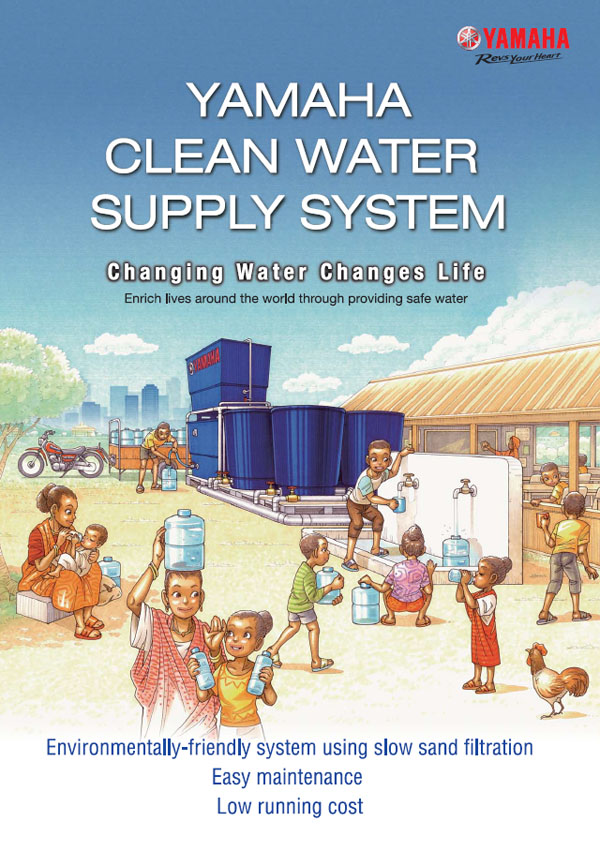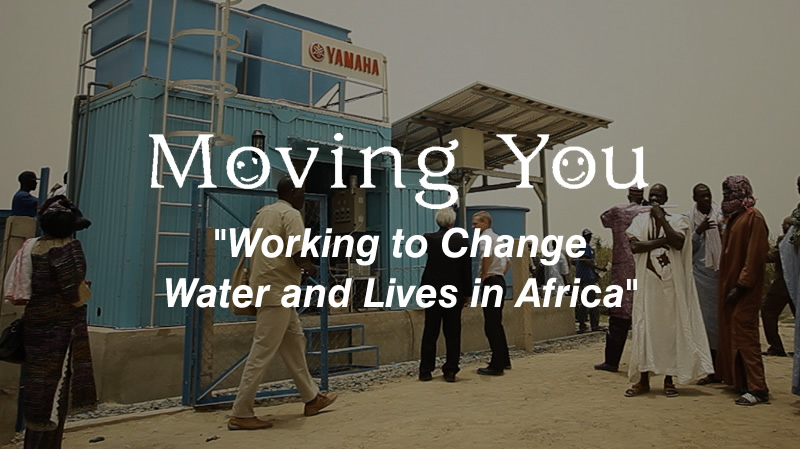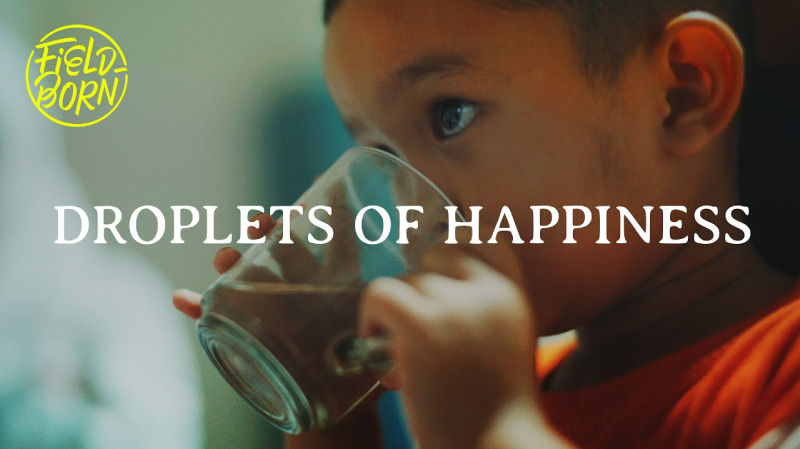Products
YCW-008A/002A
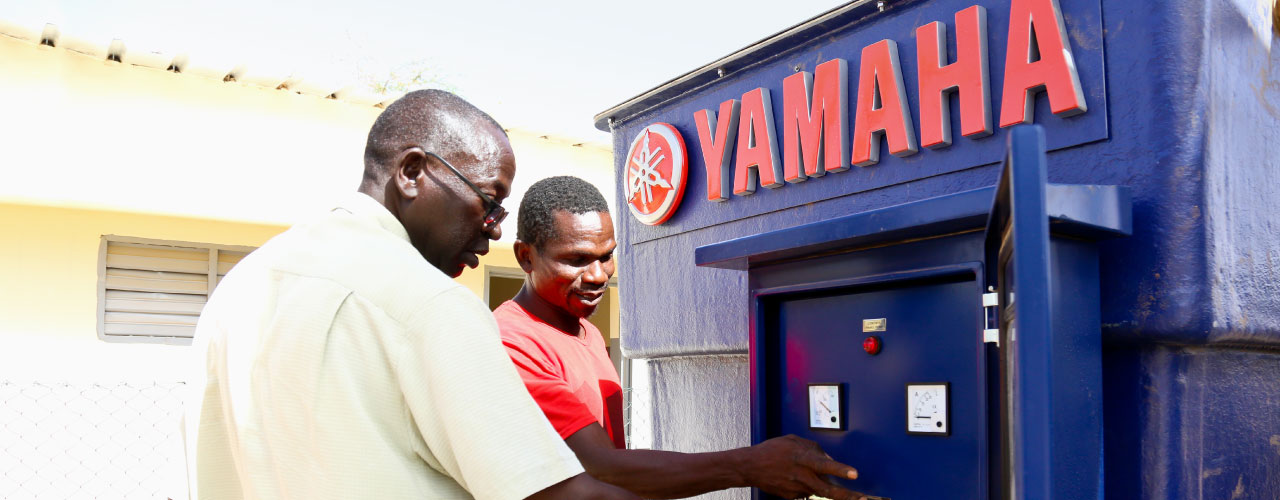
Rain falling into the mountains seeps into the ground and slowly travels through the water vein over time. In the meantime, the water is gradually purified by microorganisms, etc., and eventually becomes clean water and springs out at the foot. If you imagine such a scene, you may understand the characteristics of the Yamaha Clean Water Supply System (hereinafter referred to as YCW). The YCW, which applies the mechanism of natural water purification by slow sand filtration, is a compact water purification device that is considered effective in small communities without water supply facilities because it does not require a large amount of electricity or maintenance by experts and can be voluntarily operated by residents.
Three major features of YCW
- Low running cost (no consumables or parts to be replaced for filtration)
- Maintenance is easy (there is no need of engineers with expertise)
- Environmentally Friendly to Use Natural Water Purification Mechanism
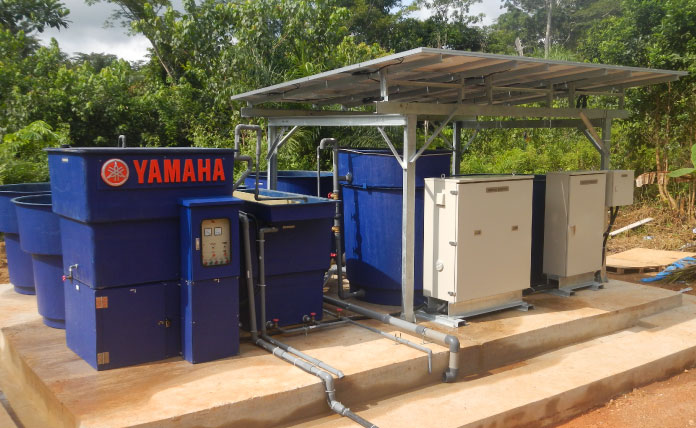
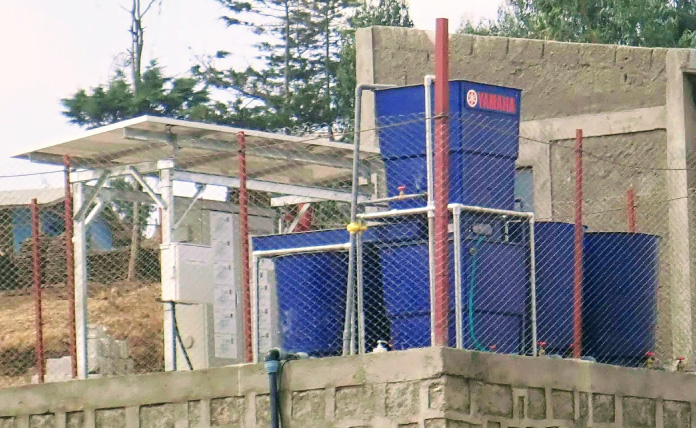
Specifications
YCW has two models as shown in the table. We will propose appropriate specifications according to the size of the village, hospital, school, beneficiary population and budget.
| Model | YCW-008A | YCW-002A | |
|---|---|---|---|
| YCW (Water purification system) | Installation dimensions (Concrete foundation) | 10m x 8m | 6m x 6m |
| Water purification methods | Coarse Filtration + Slow Filtration (Sand Filtration + Biological Purification) + Chlorine disinfection | ||
| Main parts | FRP tank + Filter material (sand and gravel) + Control panel + Electric pump + PVC pipe | ||
| Gross weight | About 27 tons | About 7 tons | |
| Water purification production | Approximately 8,000 liters per day | Approximately 2,500 liters per day | |
| Projected beneficiary population | About 2,000 people | About 600 people | |
| Power supply | AC single phase 220V | ||
| Power consumption | Approx. 5.5 kWh/day | Approx. 1.7 kWh/day | |
| Number of motorized pumps | 4 (Chlorine drip pumps included) | 1 | |
| Chlorine Method of supply | Automatic drip using an electric pump | Manual drip by hand pump | |
| Photovoltaic (hereinafter referred to as PV) hardware | Output voltage | 50 Hz AC single phase 220V | |
| PV modules | 3,360W (280W x 12 sheets) | 1,120W (280W x 4 sheets) | |
| Battery | Deep-cycle lead-acid battery 2V-500Ah x 24 series 48V-500Ah (Can handle no sunshine for 3 consecutive days) |
Deep-cycle lead-acid battery 2V-300Ah x 12 series 24V-300Ah (Can handle no sunshine for 3 consecutive days) |
|
| Logistics: Number of containers (country of shipment) |
YCW main unit: 20 ft x 1 (Indonesia) Filter material (sand and gravel): 20 ft x 1 (Japan) PV hardware :20 ft x 1 (Japan) |
YCW main unit + filter material (sand and gravel) + PV generator: 20ft x 1 (Japan) |
|
- FRP: Fiber Reinforced Plastics
- PVC: Polyvinyl chloride
- Projected beneficiaries are calculated by assuming the volume of drinking water as 4L/ person/day
- Please note that specifications are subject to change without notice
Basically, a customer is required to arrange the following items locally.
- Piping from the intake to the raw water pump, and from the raw water pump to the water purifier
- Concrete foundations, parts storage shed, water faucet, fence
- Purchase of chlorine powder periodically for chlorine drip after installation
Local residents will also cooperate in the installation under the supervision of Yamaha engineers or contracted engineers. Participation in the installation work is effective for raising the awareness of the residents that “this device belongs to them”. At the same time, it is also a part of maintenance training to deepen the understanding of the mechanism of the equipment. PV devices are available as option in places where grid electricity is not available or unstable, or for the sake of reducing greenhouse gas emissions.
How it works
YCW uses a slow filtration system that utilizes the purification mechanisms of nature. In slow filtration, in addition to physical filtration by sand, micro-organisms that were present in the raw water (rivers and lakes) grow in the upper layers of the sand layer, and their action makes it possible to purify finer substances that cannot be cleaned by sand filtration alone. In addition, before the slow filtration tank, there are pre-treatment tanks with gravel, which pre-filters larger substances. After slow filtration, the water is given a final chlorine drip to disinfect bacteria before it becomes drinking water. Basically, the water flows by gravity, but electric pumps are used in the areas where it is inevitably raised from low to high.
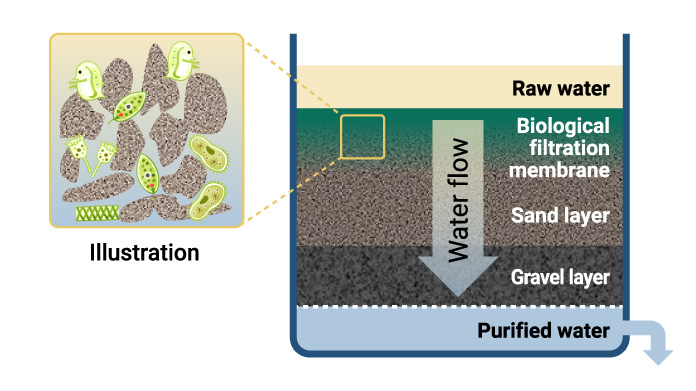
Performance
YCW cannot purify water from all rivers and lakes enough to be safely drinkable. Because we adopt a water purification system called slow sand filtration, water that can be cleaned is limited. Only when the substance in the raw water in the table are below the upper limit below, they can be reduced to below the WHO Drinking Water Guideline.
- NTU is a turbidity unit defined in the WHO Guidelines for Drinking Water
- CU (color unit) shows apparent colors in units of color degrees
- TCU (True Color Unit) is the absolute color unit defined in the WHO Guidelines for Drinking Water
- Seawater, pesticides, heavy metals other than the above, organic/inorganic substances, etc. are not subject to purification
- Performance when biological filtration membranes are kept in optimal maturity
| Item | Upper limit for raw water | WHO Guidelines for Drinking Water |
|---|---|---|
| Turbidity | 300 NTU | 5 NTU |
| Color degree | 470 CU | 15 TCU |
| Iron | 1 mg/L | 0.3 mg/L |
| Manganese | 1 mg/L | 0.1 mg/L |
| Aluminum | 0.4 mg/L | 0.2 mg/L |
| Ammonia nitrogen | 3 mg/L | 1.5 mg/L |
| Coli | 600 pcs/100mL | 0 pcs/100mL |
| Coliform group | 32,000 pcs/100mL | 0 pcs/100mL |
After-sales service
In the event of any failure due to defects in our products within one year after delivery or during the period stipulated in the sales contract, we shall take measures such as repairs at our own expense. If any other defects occur, the cost will be borne by the buyer, and either we or the local distributors, NGOs, consultants, contractors, etc. under our contract will handle repairs, etc.
Included parts, etc.
The main body of the water purifier includes the annex parts as shown in the table. Please note that the contents are subject to change without notice.
| Accessory parts | Measuring spoon, pipette, coliform test kit, sample bottle, measuring cup, measuring cylinder, tester (current/voltage meter), transparency meter, pH test paper, residual chlorine analyzer |
|---|---|
| Special tool | Mud scraper (used to scrape out mud that accumulates at the bottom of the pretreatment tanks) |
| Spare parts | Raw Water Pump, Clean Water Pump, capacitor/check valve/cap for each pump, orifice plates, O-ring, water level sensor, intake cage, foot valve, Pretreatment Tank inspection window lid, fuses |
| Descriptive documents | Owner's manual and manual for setting up a water committee |
